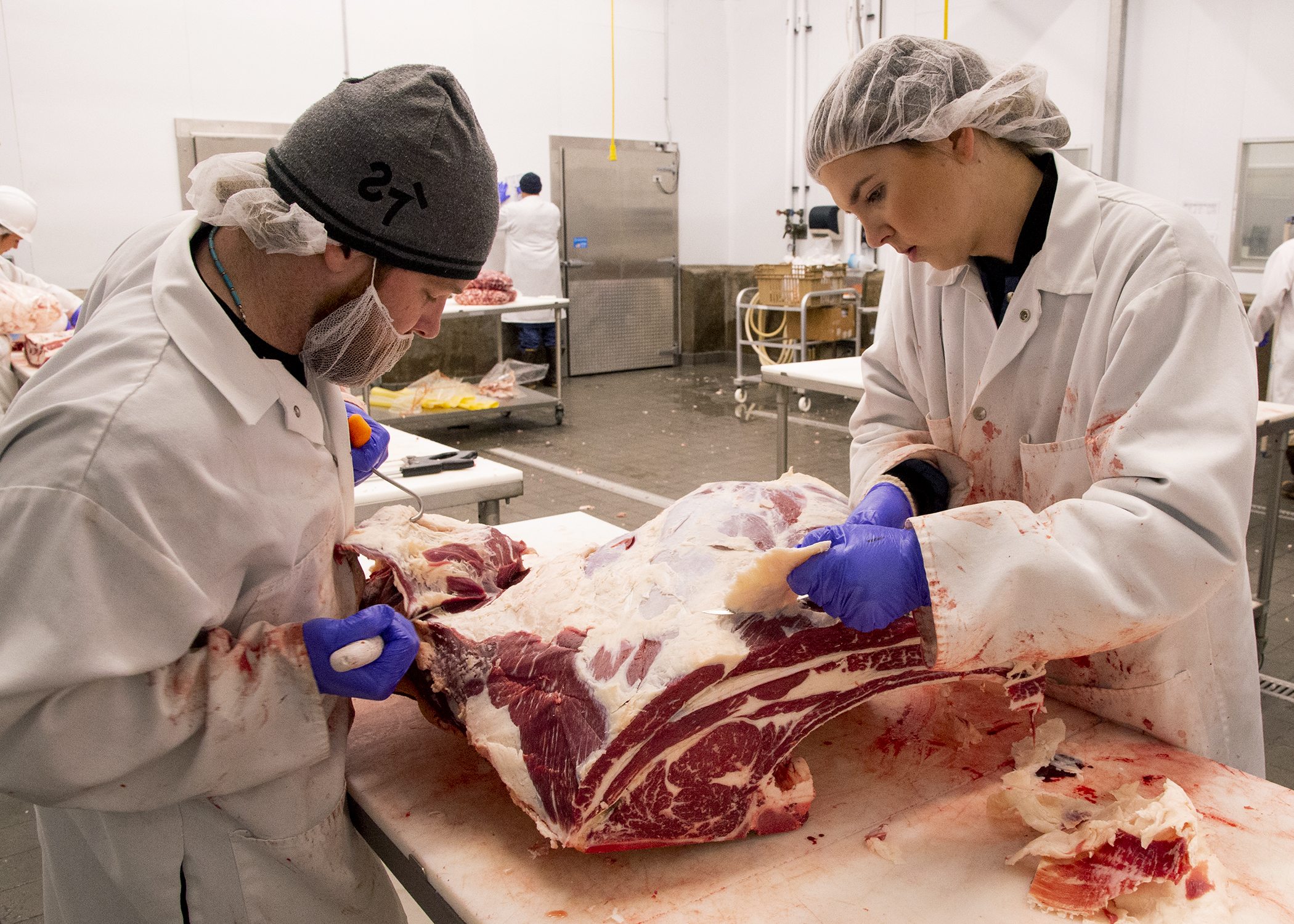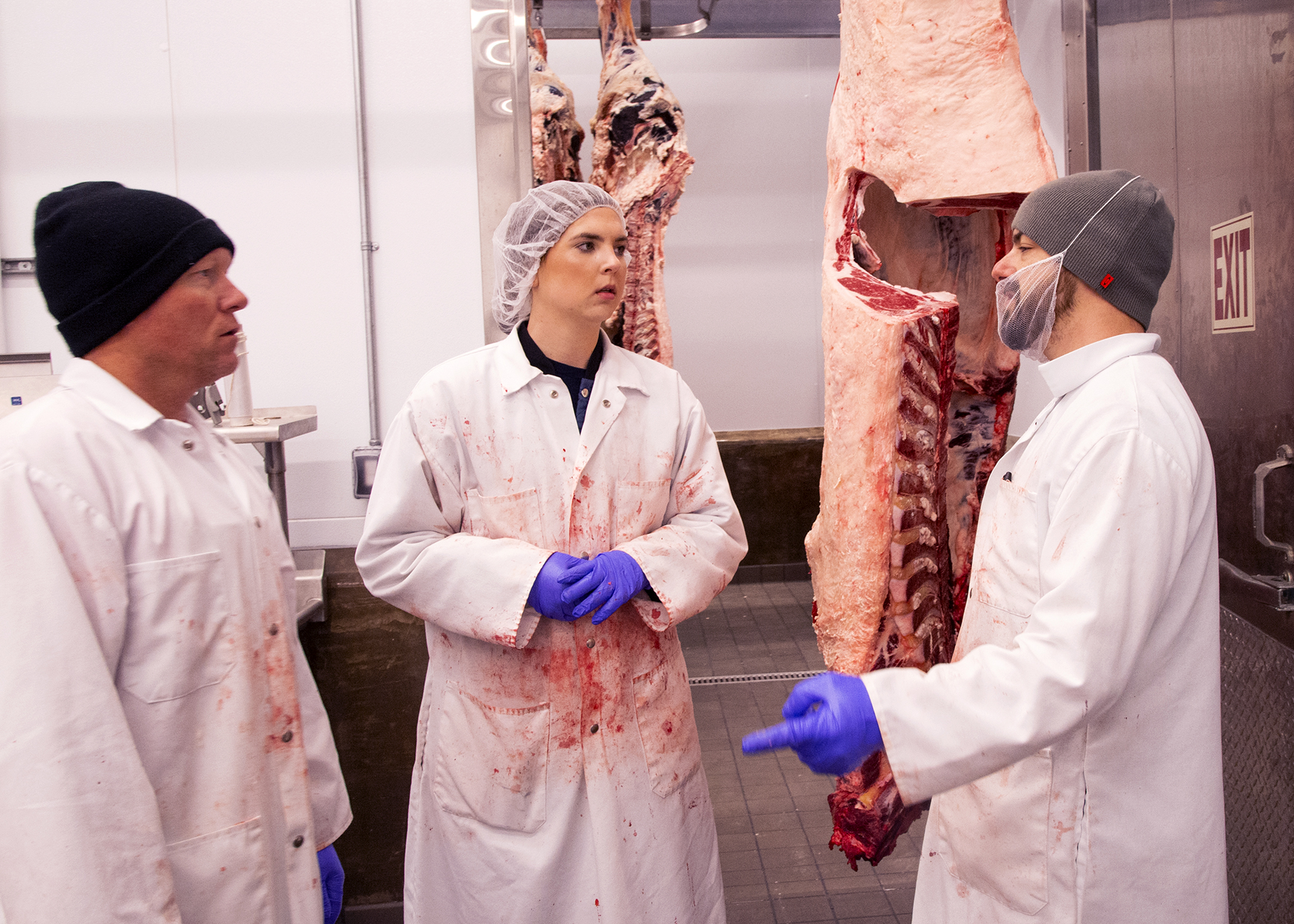- Science
- Agriculture
- Jon Mark Beilue
- Research
- Community
Doing much more with less
Caviness Center has beefed up production, sales during COVID
While the campus of West Texas A&M University has been mostly quiet and hollow since spring break, there is one small pocket on the east edge of Russell Long Boulevard that has been anything but.
“The kids that are here, they are working their tails off,” said Dr. Ty Lawrence. “We’re not a traditional labor force. Since the COVID outbreak, the other faculty and I are working side by side to make this happen.”
It is the West Texas A&M Meats Lab, or specifically, the Caviness Meat Science and Innovation Center, and within that, Doc’s Prime Meats, its retail store. Between the two, they have been selling beef, pork, poultry and lamb to the public, an Amarillo burger chain and local food banks as fast as they can produce the products.
“We’ve never stopped,” said Lawrence, director of the Meat Lab and Beef Carcass Research Center as well as an assistant professor of animal science. “We had a long discussion with (WT president) Dr. (Walter) Wendler and the administration when the outbreak hit.
“We all made the decision that we were going to move forward and support this community and the Texas Panhandle and we’ve really never stopped. My team has been here five days a week through all of this.”
It’s been in a way a welcome strain and challenge since mid-March. Because of the COVID-19 outbreak, the student workforce is about one-third of what is has been. But also because of the COVID-19 outbreak, demand for meat products has never been higher.
Literally doing more with less.
“You do your best to plan and prepare,” Lawrence said. “We’ve had some nervous days. Not all are black and white. Through these candid conversations with Dr. Wendler and senior administration, we were going to serve the public to make sure meat is available. We have that ability and so we’ve made it happen.”
The Meat Lab provides products for food banks in the Panhandle through Cactus Cares, a philanthropic arm of Cactus Feeders, and recently began providing ground beef for an Amarillo hamburger chain that was dropped by its food supplier. But the uniqueness of sale of its products is through its retail store – Doc’s Prime Cuts.
The store is named for Dr. Ted Montgomery, the first meat scientist to work at WT. He opened the first meat lab in 1974, and was a mentor to Lawrence. He retired in 2004.
Inside the glass front of Doc’s Prime Cuts are signs for sausage, pork tenderloin, flat iron steaks, short ribs, lamb — and the list goes on. On another wall are shelves of available shirts for sale that tout the Caviness Center.
Prior to the pandemic, Doc’s was open six days a week, Monday through Saturday. Since then, it’s open only Monday and Friday. Prior to the pandemic, there was a significant backlog of beef in the freezers. Not any longer.
Because of health issues that affected production at major beef and pork processors, supply and the amount consumers could purchase were affected at most traditional suppliers in the area.
Doc’s picked up the slack. Did it ever. Prior to the pandemic in mid-March, sales were approximately $2,000 in a six-day week. Since then? It’s like a cattle drive for the public where some are waiting for the doors to open.
On May 22, Doc’s Prime Cuts did $15,000 in sales. That wasn’t even the record. The previous Friday, May 15, a phenomenal $25,800 in product was sold in an 8-hour day. The little beef retail store went from selling $2,000 a week open six days a week to nearly 15 times that amount open only two days a week.
“Some of it is just sheer availability,” Lawrence said of the explosion. “The local retailer may have their supply limited some by the pandemic and they may say, ‘Go down to WT and they can take care of you,’ and we have. Some of it is sheer word of mouth.
“But I will say the world is getting back to normal a little bit. Those facilities slowed or in some cases stopped to allow workers to rest and recover. We knew there would be a temporary meat shortage so when it finally hit, it was not unanticipated.”

‘Unparalleled’ meat lab
A meat lab at WT is nothing new. There’s been one on campus for 46 years. But comparing the Caviness Center, which opened in August 2018 in the Paul Engler College of Agriculture and Natural Sciences, to the previous meat lab is like comparing a stale old gym to a gleaming arena. The previous lab was about one-fifth the size of the new one — more than 15,000 square feet.
Lawrence, with two of his degrees from WT, had a major say in the design of the lab. On one side of the long main cement hallway is what they call the “raw side” of the beef, and the other side is the processed.
Large windows were intentional in each specific room for transparency. It’s a learning environment as well. Two rooms could store as many as 70 cattle carcasses at 35 per room. A teaching classroom that seats 80 adjoins the Meat Lab.
“In many ways, this meat lab is unparalleled,” Lawrence said. “Colorado State and Wisconsin are getting something comparable, but it’s the largest meat lab that I’m aware of at a university in the country. We really are just a mini-version of Tyson, Cargill, JBS.”
The Meat Lab is just part of ongoing development in the agricultural sciences department.
The new Center for Advancing Food Animal Production in the Panhandle will receive state funds of $4 million over the next two years — $2 million to the agriculture sciences department and an additional $2 million for Texas A&M’s College of Veterinary Medicine’s Veterinary Education, Research and Outreach (VERO) Center.
The Center enables students to specialize in animal health, animal care, animal nutrition and pre- and post-harvest food science/food safety.
The major funding initiative also includes monies for seven new faculty members, 10 graduate student assistants and six support staff positions. The Center enables students to specialize in animal health and care, animal nutrition and pre- and post-harvest food science/food safety.
Before the pandemic, about 25 undergraduate and graduate students in the animal science field worked at the Meat Lab which is supported by three faculty members as directors – Lawrence, Dr. Travis Tennant and Dr. Loni Lucherk.
WT gets its cattle from about 20 different feedlots in the area – “share the love,” Lawrence said.
Students learn every phase of the production – animal slaughter, dress the carcass, beef cuts, ground beef manufacturing, packaging and marketing.
“It’s immersion,” said Kaitlyn Wesley, a graduate student from Texas Tech. “It’s ‘elbows deep’ for everyone. To help make food for someone else, we take real pride in that. This is valuable experience in the whole process.”
Wesley and Tylo Kirkpatrick, also a Tech graduate, will defend their master’s theses later this month. On this morning, they were behind computer screens. About two-thirds of the Meat Lab responsibility is third-party research services across North America. That falls mostly to grad students.
Cattle carcass data collecting has taken grad students to packing plants in Canada, Washington, Arizona, Nebraska and South Dakota among some of the stops. Kirkpatrick was part of a team under Tennant that qualified with eight gold medals in Madison, Wis. to the International Deutscher Fleischer Meat Processors Contest in Frankfurt, Germany last year.
“About a month ago, we harvested 35 head of cattle in one day,” Kirkpatrick said. “I’m not sure there’s a single meat lab in the country on that scale.”
The Caviness Center, whether it’s providing meat to the public or education to students, has been a dream for Lawrence since returning to his alma mater in 2004.
“We’re the center of beef production in America,” he said, “and we’re proud to say we provide the same level of education to the students who come to WT – and they come from all over.”
Do you know of a student, faculty member, project, an alumnus or any other story idea for “WT: The Heart and Soul of the Texas Panhandle?” If so, email Jon Mark Beilue at jbeilue@wtamu.edu.

